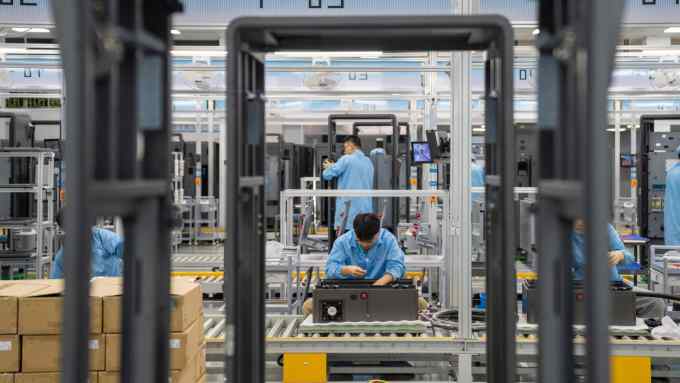China’s high-tech output drives growth in factory activity

China’s factory activity has expanded for a second consecutive month, led by rising high-tech manufacturing output, as the country’s leaders pledged more support for an economy they said “still faces many challenges”.
In a meeting on Tuesday, the Communist party’s 24-member leadership body, the Politburo, laid out measures to shore up growth and announced that a long-awaited important policy meeting, the Third Plenum, would be held in July.
“The economy still faces many challenges as it continues to rebound, mainly due to insufficient effective demand . . . and the complexity, severity and uncertainty of the external environment have significantly increased,” the meeting concluded, according to state-owned news agency Xinhua.
The meeting came as the statistics bureau announced that China’s purchasing managers’ index was 50.4 in April, slightly above analysts’ expectations for 50.3 in a Bloomberg poll but below 50.8 in March, according to official statistics.
The National Bureau of Statistics said equipment manufacturing and high-tech manufacturing PMIs were 51.3 and 53.0, respectively. While these were down from the previous month, “they continued to be in the expansion range and were both higher than the overall manufacturing industry”.
“High-end manufacturing maintained rapid development,” the NBS said. Any figure above 50 shows expansion in activity.
The figures, which show that China’s factory activity continues to recover despite deflationary pressures and weak external demand, follow mixed data releases in recent months for the country’s economy.
Industrial profits data released on Saturday showed a decline of 3.5 per cent year on year in March, “raising further doubts about the economy’s momentum”, said foreign exchange group Ebury in a report ahead of the PMI release.
The strong performance in high-tech industries follows a call by President Xi Jinping to boost growth by unleashing “new quality productive forces”, which encompasses sectors such as electric vehicles, green energy and other areas of advanced manufacturing.
The Third Plenum of the party’s Central Committee is traditionally held once every five years and usually discusses economic policies and reforms.
On Tuesday, the Politburo also said that the issuance of ultra-long government bonds to fund stimulus, mooted last month to boost domestic demand, should be launched “as soon as possible”.
The Politburo said China’s economic foundation was “stable” and had “great potential” but added that measures were needed to “expand domestic demand” and consumption.
The US and Europe are concerned that Chinese policymakers are not doing enough to boost consumption and instead are driving overcapacity in manufacturing in an effort to boost growth, which they say is raising the risk of dumping on export markets.
Beijing has rejected western warnings about overcapacity as protectionism, while state media have said it is part of a US plot to contain China’s development.
Xi is due to embark on a trip next week to meet European leaders including French President Emmanuel Macron. The EU has instigated a series of anti-subsidy and other investigations into Chinese goods and producers in recent months.
Beijing has set an economic growth target for this year of 5 per cent.
Goldman Sachs said before the PMI data release that “high-frequency indicators such as steel demand showed muted growth in April”, adding that it expected a drop in construction stemming from adverse weather in southern China this month.
Non-manufacturing PMI, which includes construction and services, was 51.2, lower than analysts’ median forecast of 52.3 and down from 53 in March.









Comments
Signed in as OVO.DL